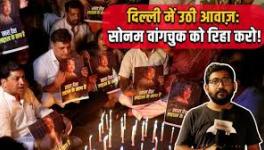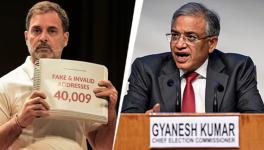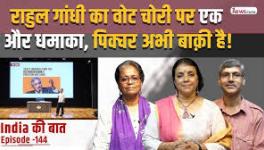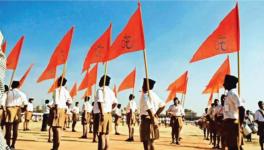What Comes After the Euphoria Over AAP’s Punjab Victory
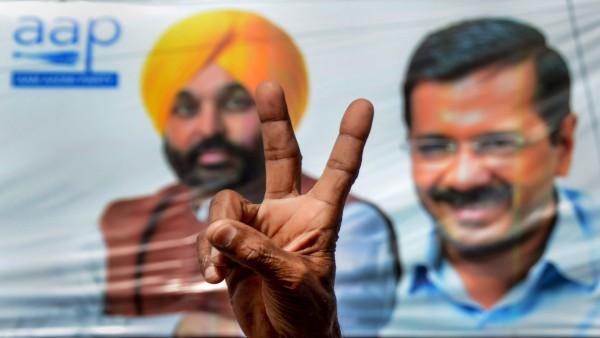
Image Courtesy: Oneindia
The overwhelming victory of the Aam Adami Party (AAP) in Punjab is being celebrated by people. It is an unprecedented occurrence. Canada-based TV channel Prime Asia telecast Punjabis across time zones glued to TVs and laptops, watching the results. It was heartening to watch them celebrate the victory of an untested political party, whose performance in Delhi they saw as a litmus test that assures them of a bright future for Punjab. In other words, we witness rising expectations of Punjabis from the newly-elected party.
This euphoria reminded me of the 1977 Lok Sabha election when the newly-formed Janata Party won overwhelmingly. Consider the parallels between the two events: all prominent leaders of the Congress, including Indira Gandhi, had lost their seats in that poll. Similarly, Parkash Singh Badal, his son, his daughter-in-law, his son-in-law, son’s brother-in-law and nephew have lost the election in Punjab. The incumbent chief minister and his predecessor have lost on the Congress side. Nobody expected this, including politicians, journalists, commentators and political experts.
In 1977, the unholy alliance of various parties could not sustain for long. The Congress party returned to power in 1980. It is here that there is a difference between these two moments. The present is a case of one party’s victory in a small state. There is no evidence that such a significant shift would occur in other states. In fact, the signals are contrary to a change of guard in other states.
What Punjab’s people have done is stall the entry of the Bharatiya Janata Party in their state—the party which significantly contributed to the decline of Akalis. The BJP is not just a political party with Hindutva ideology. It is a massive corporation. We used to hear from experts from Pakistan that the Pakistani Army resembles a corporate group. The BJP has successfully converted itself into a corporation, without the power of an army, by creating civil militia-type aggressive organisations that openly exercise violence in a limited way. At this moment, it is the wealthiest party in terms of resources. It has an IT wing that incessantly engages in manufacturing truth. It has various platforms from where the ‘truth’ is disseminated successfully. From the top to the bottom, BJP leaders publicly speak the ‘truth’ with the confidence and self-assurance of an ignorant individual. Now, the challenge to the advancing BJP juggernaut has emanated from the people in Punjab. In the process, they have stalled the conglomeration of corporate groups against which the farmers’ movement created a discourse.
The voters of Punjab have also demonstrated that under their euphoria lies a rejection of the BJP’s divisive policies. Many opine that it is nothing short of a revolution, echoing JP’s characterisation of the Janata Party victory as “total revolution”. All these opinions may be understood as the function of euphoria gripping the people at the moment.
However, when all the excitement is over, the harsh realities of Punjab’s bankrupt economy, political degeneration and declining income of people would begin to stare in the face of the leaders in power. The structure of governance in Punjab created during the ten-year rule of the Akali-BJP alliance and perpetuated by the Congress for five years assures the subservience of the police force to the elected legislators.
Corruption in higher places adversely affects the economy of Punjab, which would be a significant challenge for a party that boasts of an honest and clean government. Being honest is one thing; showing competence in efficiently handling the bureaucracy is an altogether different ball game. Fortunately for Bhagwant Mann, the Chief Minister-designate of Punjab, he can replicate the Delhi model. But even this replication is not an easy turf, for Punjab is an altogether different pitch to play the game of politics.
In this context, Mann’s victory speech is crucial. He has said Punjab would learn from Delhi and Delhi would learn from Punjab in some issues. He also indulged in symbolism in which the BJP is regarded as more specialised than any other party. He said government offices would only display photographs of two personalities, Shaheed Bhagat Singh and Dr BR Ambedkar. He also informed that the swearing-in ceremony would be at Bhagat Singh’s village, Khatkar Kalan, Shaheed Bhagat Singh district.
But at the moment, Punjabis are enjoying the unprecedented defeat of five chief ministers—four from the past and one the incumbent. A viral WhatsApp message reads: ‘Punjab election results have made everyone happy. Rahul Gandhi is happy that Captain Amarinder has been cut to size. Captain is happy that Sidhu hasn’t won. Sidhu is happy that the choice of Channi proved to be wrong. Channi is happy to have become Chief Minister even if briefly. Congress is happy that Akalis have been prevent from coming back to power. Akalis are happy Congress didn’t return to power. With so many people happy, most of them Punjabis, the stock recommendation is easy’.
The author was professor of sociology at Guru Nanak Dev University, Amritsar, and is a former president of the Indian Sociological Society. The views are personal.
Get the latest reports & analysis with people's perspective on Protests, movements & deep analytical videos, discussions of the current affairs in your Telegram app. Subscribe to NewsClick's Telegram channel & get Real-Time updates on stories, as they get published on our website.













